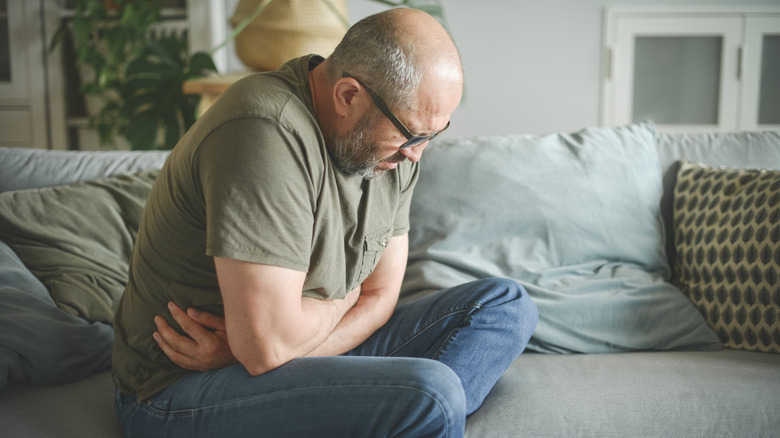The Long-Term Side Effect You Might Experience After Getting Norovirus
If your stomach is churning and you feel the impending need to throw up, it's probably norovirus — often referred to as the "stomach flu" — causing your gastrointestinal discomfort. The U.S. Centers for Disease Control and Prevention (CDC) reports that the virus is the top cause of food poisoning and is often the culprit behind unpleasant symptoms like vomiting and diarrhea. Norovirus is highly contagious and responsible for approximately 2,270,000 doctor visits to outpatient clinics every year in the U.S., with the majority of norovirus cases seen in children (via CDC).
While additional symptoms may include fever, muscle aches, and more, the majority of symptoms pertain to our digestive tract. This is because norovirus prompts what's known as "acute gastroenteritis," or inflammation within the intestines and the stomach. Most of the time, the misery of norovirus illness lasts only 24 to 72 hours. However, some people may experience chronic gastrointestinal inflammation even after they've recovered, potentially leaving them with a diagnosis of inflammatory bowel disease (IBD), according to research from a 2022 study published in Nature.
The potential link between norovirus and IBD
Using mouse models, researchers found that norovirus may impact the functioning of a key protein whose job it is to communicate to our immune system to cease fire on our gastrointestinal tract once the infection has been fought off. Co-author of the study Ken Cadwell explained to NBC News that it's our body's T-cells that produce this protein, but norovirus infection appears to hinder their proper functioning. For some people, this can lead to the development of inflammatory bowel disease (IBD), specifically Crohn's disease, which is characterized by ongoing gastrointestinal symptoms such as diarrhea, abdominal pain, and various other effects on the body. For patients already diagnosed with inflammatory bowel disease (IBD), norovirus infection may worsen symptoms, according to 2009 research published in the Journal of Pediatric Gastroenterology and Nutrition.
Speak with your doctor if symptoms of norovirus infection do not subside within three days. Norovirus infection can also put one at risk for dehydration, so see your healthcare provider if you experience decreased urine output, dizziness, fatigue, or any other unusual symptoms.


